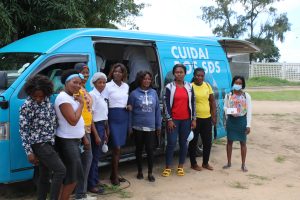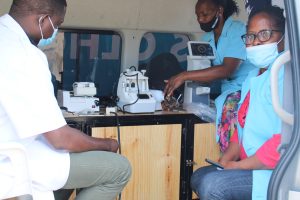Only a few districts in the Mozambican province of Inhambane have eye care and ophthalmological professionals, leaving populations in rural areas farthest from urban centres neglected. Mobility problems and gender inequalities hinder access for the most vulnerable people, generally women and girls, and mean that much of the population does not have access to prescription glasses.

For this reason, Eyes of the world has created a fully equipped mobile eye health unit to guarantee accessibility to optical revisions and corrections in the most remote rural communities far from health centres. This project persists in strengthening the capacities of the public health system and in empowering the local women’s organization (AMODEVI) Associaçâo para Mobilizaçâo no Desenvolvimento de Vilankulos) which oversees managing this new care service.
On July 7, the inauguration of the mobile unit in the Panda district took place, chaired by the Secretary of State of the Inhambane Province, Dr. Ludmila Maguni, who appealed to the population of the 14 districts to take care of their visual health and go to the consultation and optical services of this mobile unit, which is expected to check the vision of some 4,200 people every year and provide 1,400 glasses.
The start-up took place on July 8, in the Vilankulos district, with the delivery of the mobile optics to the AMODEVI women’s association to start managing activities aimed at reducing blindness due to uncorrected refractive errors. In this opening ceremony, 70 people were already attended to.

By bringing optical care and the availability of optical corrections to the population, the project aims to improve people’s well-being and persevere in a sustainable model of public eye health that favors the elimination of barriers that hinder the population’s access to ophthalmological care.
The Eyes of Mozambique project is financed by the Barcelona City Council and the Baztán City Council.